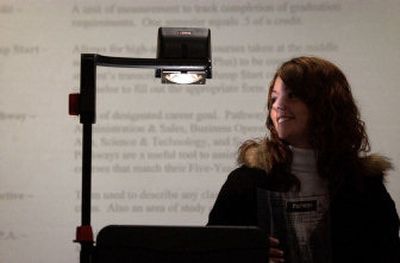Freshman failures worry schools

To Central Valley High School student DominickMartinez, freshman year is like climbing a mountain.
“At first, it’s really hard, but once I get to the top, it’s going to be easy,” the 14-year-old said.
But Martinez knows he’s got one more steep grade to scramble over before he reaches the summit.
“I’m failing math,” Martinez said. “It’s always been really hard for me.”
He isn’t alone. There are plenty of freshmen students familiar with the letter F.
According to the progress reports sent to parents of CVHS students Wednesday, 130 out of the 492 freshman – or 26.4 percent – are failing a class first semester. An additional 63 students are getting a D grade, said Leanne Donley, a freshman English teacher.
“That’s actually fairly normal,” Donley said.
Statistics show that nationally one out of three high school students will fail one or more classes as a freshman.
At a recent school board meeting, a University High School student leader told the Central Valley board that about 40 freshmen students at U-Hi failed a class this trimester, which ends this week. Central Valley operates on a semester system, with the first one of the year ending in February.
“Freshmen failure is a huge problem,” Central Valley’s Donley said. “The transition from middle school to high school has become one of the most difficult adjustments.”
Recognizing the problem, schools, teachers and older students appear to be stepping up to the challenge.
Spokane Public Schools, the largest school district in Spokane County, does not produce districtwide reports on freshmen for first quarter grades, but school officials are actively trying to get students to perform at their highest levels. The quarter ended Nov. 17.
“Our goal is to catch students before they fail a class,” said Spokane Public Schools spokeswoman, Terren Roloff. “(We) have been very intentional about putting our limited resources into extra assistance for students.”
Students are continually assessed to ensure everyone grasps the content, Roloff said. Students who struggle get a variety of support including after-school tutoring centers at the high schools and math labs at all secondary schools before and after school, she said.
Any student receiving a C or lower at Central Valley is required to attend student access time each morning with teachers.
Donley also is the adviser of the Link Crew, a mentoring club in which Central Valley upperclassmen are assigned freshmen students. Starting next week the Link Crew will offer morning tutoring sessions two days a week to help freshmen get their grades up before the end of the semester.
Neighboring University High School also has strong link program to help younger students succeed, as does East Valley High School.
“There are so many things going on for them,” Donley said of the freshmen. “Things matter more now than ever, and they just don’t realize it.”
In addition to not receiving credit, students who aren’t passing classes may not grasp concepts needed to pass Washington Assessment of Student Learning, also known as the WASL. This year’s class of sophomores is the first required to pass the test in order to graduate.
“It’s not like junior high anymore; you can’t just fail a class and move on,” said Central Valley junior Krystal Peters.
Peters and classmate Amanda Portch, both Link Crew members, were teaching a class full of freshmen Wednesday about vocabulary words that students should be familiar with, like prerequisite, GPA (grade point average), elective and transcript.
They also did some math, using a former student’s transcript to show how a GPA – often one of the key factors colleges use to determine admission – is affected by just one failing grade.
“We have six classes every semester, and that’s a lot of classes to get behind in,” Portch said. “Failing one class will count for the rest of high school. You can never really recover.”
East Valley Link Crew leader Mark Jones, 17, even goes so far as to check with one of the teachers of the two freshmen he mentors.
“I’ll just stop in and ask how they are doing,” Jones said. “They have the same English teacher I had, so I know what she is like.”
Torie Nee, 14, and Brooke Meyre, 15, say having Jones’ attention helps. Neither is failing any classes.
A week before finals in January, the East Valley Link Crew plans to host a study night. Students are also encouraged to attend one of four after-school study sessions offered each week.
In addition to a strong Link program, teachers at East Valley began an academic teaming program with freshmen last year. Freshmen are put into 90-student communities for English, science, social studies and career exploration for part of the day.
Assistant Principal Mark Purvine said the program has cut discipline problems in half and has helped identify freshmen who are struggling to keep up early on.
He could not provide the number of students failing one or more classes this semester, which ends in January.
“I would be remiss if I said I think we’ve got failure solved as an issue,” Purvine said. “It’s still a concern we look at. But I think we’re being proactive.”